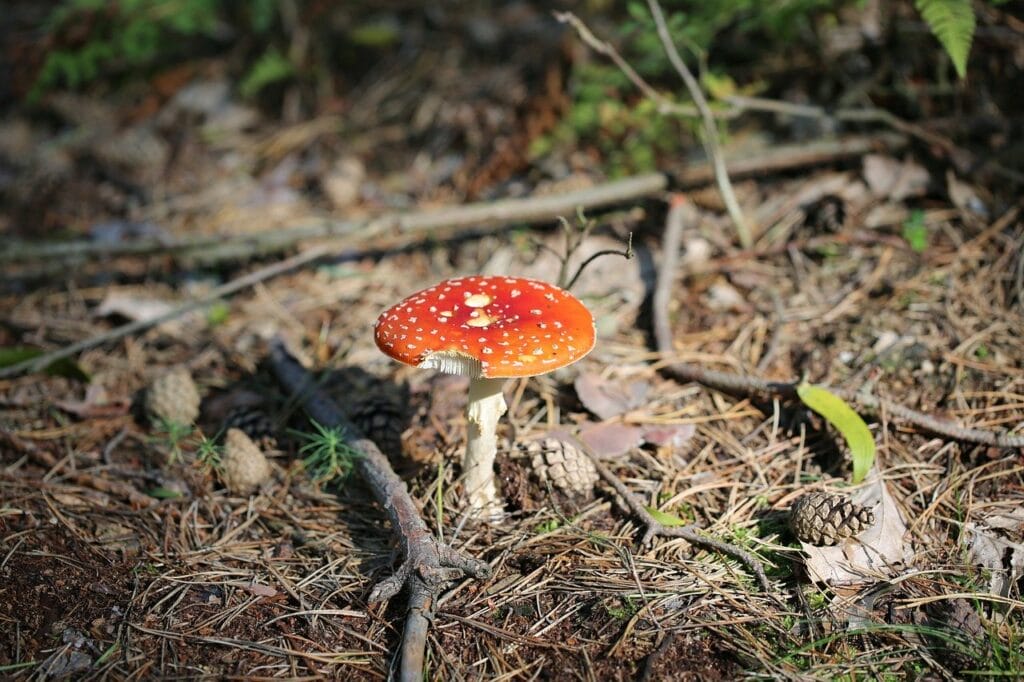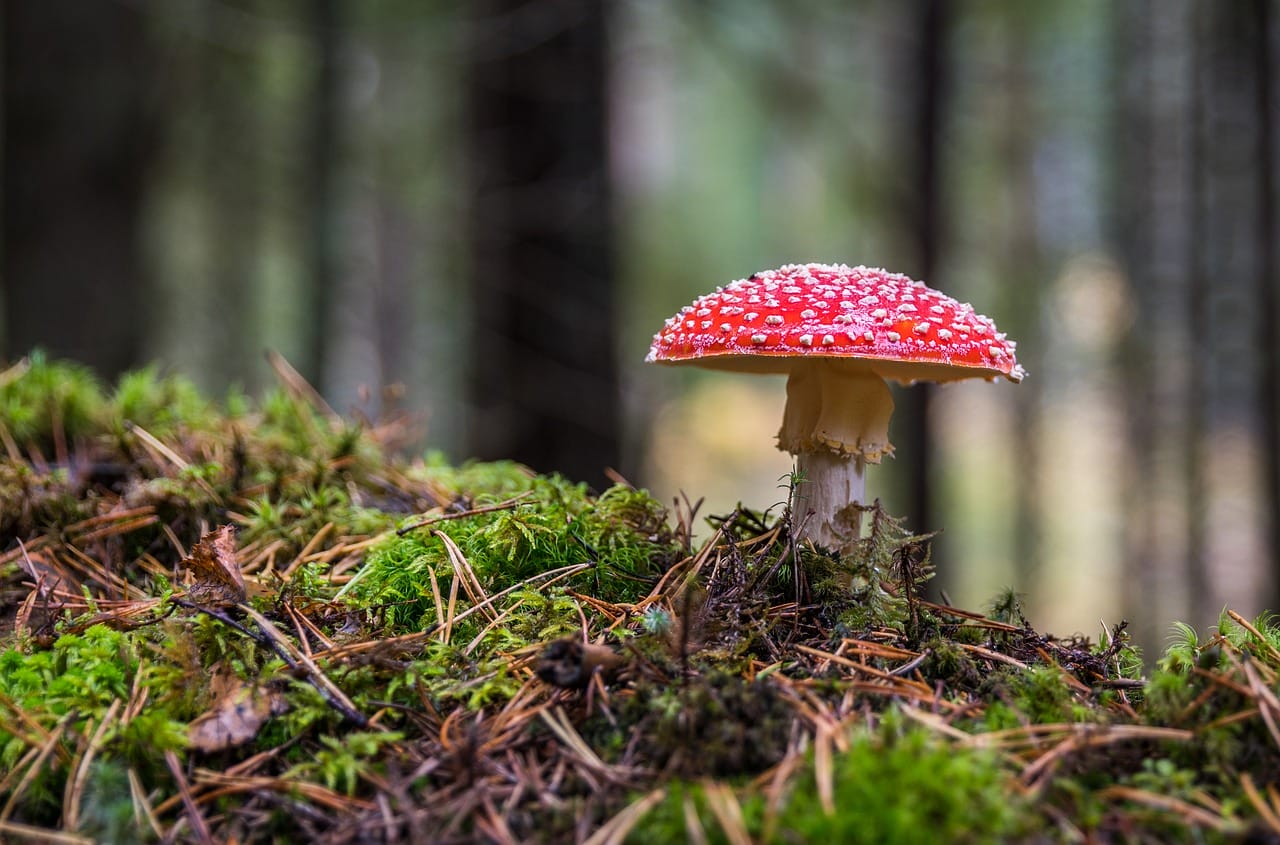For millennia, humans have identified and purposefully utilized the psychedelic characteristics of certain plants and fungi.
Notably, fungi, especially magic mushrooms, are acknowledged as the primary natural provider of psychedelic substances.
Psilocybin, a psychedelic substance derived from mushrooms, holds an important place in history due to its usage in spiritual rituals and therapeutic processes.
Many researchers are dedicating their work to exploring the potential health benefits of shrooms online. Current studies have shed light on the effects of psilocybin mushrooms, bringing hope to many people and highlighting the need to discuss their inclusion in Canada’s healthcare system.
Key Points:
- Magic mushrooms, which contain the psychoactive compound psilocybin, can potentially help address mental health problems in Canada.
- Psilocybin is considered safer than opioids, with a lower risk of addiction and toxicity.
- Psilocybin has been proven to be effective in treating depression long-term, with effects that can persist for up to a year.

Understanding Psilocybin
Psilocybin is a tryptamine, or indole-alkylamine, obtained from magic mushrooms and shares structural properties with lysergic acid diethylamide (LSD). It provokes hallucinogenic and euphoric experiences, likely due to its interaction with serotonin (5-HT) receptors in the central nervous system.
Thanks to its interaction with serotonin receptors, premium magic mushrooms have the potential to help regulate mental health conditions.
Canada’s Mental Health and Opioid Crisis
Common Mental Health Disorders in Canada & Resistance to Treatment
| 2012 | 2022 | |
| Major Depressive Episodes | 4.7% | 7.6% |
| Generalized anxiety disorder | 2.6% | 5.2% |
| Social phobia | 3.0% | 7.1% |
| Alcohol use disorder | 3.2% | 2.2% |
More than one-third (36.6%) of people battling mood, anxiety, or substance use disorders indicated that their healthcare and mental health needs were either unmet or insufficiently met.
An academic paper from the Canadian Journal of Psychiatry presented an understanding of the attitudes towards seeking treatment held by patients with depression. The study examined 1282 patient records from 135 physicians. Of these, 263 patients were identified with treatment-resistant depression (TRD), reflecting a prevalence rate of 21.7% across Canada.
Opioid Crisis
Approximately 8 million Canadians, representing one in five people, endure chronic pain. Uncontrolled pain can negatively affect various aspects of a person’s life.
Healthcare professionals occasionally endorse the usage of opioid medications for managing pain. While opioids can provide benefits such as easing pain and improving functionality, they also come with potential risks.
Between January 2016 and March 2022, at least 30,843 deaths related to opioid toxicity were registered in Canada. The largest number of these tragic incidents took place early in 2021, with an alarming 5,368 cases reported. It’s important to note that over 88% of these incidents were concentrated in the provinces of British Columbia, Ontario, and Alberta.
For Major Depressive Episodes
In a research study published in the Journal of Psychopharmacology, 27 individuals with a long-standing history of depression were enlisted. The majority of these individuals had been suffering from depressive symptoms for approximately two years prior to the study. 88% of these individuals had received conventional antidepressant treatments before, with 58% reporting ongoing use of such medications during their depressive episodes.
The study found significant reductions in depression after psilocybin treatment for both groups. The severity of depression consistently remained low at follow-up intervals of one, three, six, and 12 months post-treatment.
For General Anxiety and Social Phobia
A case study published in the Croatian Medical Journal in October 2021 investigated HTML:
The narrative revolves around a
A lone 16-year-old boy sought help at a mental health clinic due to his tendencies of self-isolation, severe anxiety, and declining academic performance. These issues were further exacerbated by a learning disability and a lack of enthusiasm for schoolwork, causing him to find group therapy overwhelming and ineffective.
After participating in three psilocybin sessions over 18 months, significant positive transformations were noted. His anxiety levels decreased, and he showed improved communication skills with his peers and teachers. He began to express his feelings more openly, actively engaged in group therapy, and experienced improved interpersonal relationships.
Psilocybin and Alcohol Use Disorder
A recent clinical trial highlighted in a study from JAMA Psychiatry on August 24 revealed the potential of integrating psilocybin and psychotherapy to treat alcohol use disorder. The progress of 93 patients living with the disorder was monitored over 32 weeks.
Of the 48 individuals who underwent psilocybin-assisted therapy, an astounding 83% reduction in alcohol consumption was recorded within eight months of their initial dose, in comparison to a 51% reduction in the placebo group. Almost half of the participants who received psilocybin stopped consuming alcohol completely.
Addressing the Opioid Crisis
Elena Argento, a postdoctoral fellow at the University of British Columbia and BC Centre on Substance Use, is exploring the therapeutic use of psychedelics.
Argento explains that psilocybin functions in two ways to mitigate addiction risks: it impacts both neurobiology and psychology. She highlights the transformative experiences psychedelics can provoke, characterized by a profound sense of awe and self-transcendence. These experiences often assist individuals in discovering new meanings and directions in life, potentially initiating behavioral shifts, especially concerning addiction.
In a recent longitudinal study conducted by Argento and the BC Centre on Substance Use, the study demonstrated a significant decrease in the probability of ongoing daily illicit opioid use among those who had recently used psychedelics or had done so in the past six months.
Argento’s 2018 study also proposed that psychedelic use acted as a safeguard against the link between prescription opioid use and suicide risk.
An earlier study discovered connections between psilocybin use and a lower risk of opioid use disorder. This research suggested a 40% diminished risk of opioid misuse and a 27% reduced risk associated with opioid dependence over the over the previous year because of psychedelic use.
Health Canada and Additional Regulatory Authorities Should Assess Psilocybin for Inclusion in Canada’s Treatment Strategy
Despite the recognition of Psilocybin’s potential to positively influence Canadians’ mental health, its acquisition remains challenging. It is allowed by Health Canada for healthcare professionals to prescribe this treatment under the Special Access Program. However, the program’s rigid guidelines create substantial hurdles for numerous professionals and patients.
The therapeutic use of psilocybin-containing mushrooms could revolutionize mental health care in Canada, as it can provide possibly transformative benefits. Rather than depending on traditional, but often less effective treatments like pharmaceuticals or opioid replacement therapy, psilocybin therapy presents an alternative with potential for deep and lasting effects.
Evidence implies that psilocybin therapy could result in enduring benefits, potentially sparing patients significant expenses on ineffective treatments. Moreover, research indicates psilocybin to be relatively safe, with low toxicity, minimal risk of misuse, and rare instances of overdose.
Where Can One Buy Psilocybin Online?
If Canadians find accessing psilocybin therapy challenging, they can opt to buy magic mushrooms online to mitigate their current conditions. They can browse through a variety of magic mushroom products, from high-dose shrooms to microdose magic mushrooms.
High-dose shrooms encompass psychedelic mushrooms obtainable in diverse formats, like dried magic mushrooms, edibles, or beverages, which are taken for their hallucinogenic and therapeutic effects.
Microdosing magic mushrooms involves products that contain small amounts of magic mushrooms. These products come in the form of capsules, shroom edibles, or shroom tea. Buying shrooms online offers an alternate way to discreetly enjoy the perks of these mushrooms. Strongest Cubensis Strain Canada provides only premium magic mushrooms online, ensuring the best quality.
Is Psilocybin a Suitable Option for Canadian Healthcare?
Psilocybin is often misunderstood due to its recreational use. It’s important to note that psilocybin has a safer profile compared to opioids and other drugs commonly prescribed in healthcare environments.
There is a growing evidence base suggesting its potential benefits, similar to those of marijuana, in managing various mental health disorders. dimensions of reality.
From a health and wellness viewpoint, magic mushrooms have been utilized in the support of mental health therapies and fostering personal development.
What potential risks and side effects do magic mushrooms present?
Magic mushrooms can trigger a range of effects, both beneficial and adverse. These might encompass hallucinations, changes in perception, and psychological shifts. On the negative side, they can lead to nausea, dizziness, and in rare instances, psychological distress. It’s crucial to handle the use of magic mushrooms with care and reverence, fully aware of the possible risks. Always consult with a healthcare expert before incorporating magic mushrooms into any new regimen.
Is procuring magic mushrooms online safe?
Purchasing magic mushrooms online can be secure, as long as you select a trustworthy source. It’s critical to perform extensive research on the product, the brand, and the online dispensary before committing to a purchase. Customer reviews and ratings serve as valuable pointers to product quality and service reliability. Always opt for dispensaries that put customer safety and satisfaction first, and provide secure payment methods.
Is it possible to cultivate magic mushrooms on my own?
Indeed, it is feasible to grow magic mushrooms at home, which can be a fulfilling endeavor. However, it demands specific conditions and a comprehensive understanding of the growth process. Numerous kits and guides are available online to aid you on your cultivation journey. But bear in mind that the legality of cultivating magic mushrooms varies by region, so be sure to comply with your local laws and regulations.
In the wellness domain, some individuals opt for a more moderate approach by consuming small quantities of mushrooms to tap into their benefits without experiencing hallucinations.
Articles That May Interest You:





